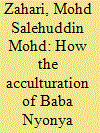| Srl | Item |
| 1 |
ID:
166634


|
|
|
|
|
| Summary/Abstract |
The migration of the Chinese community to Malacca in the 16th century has enabled the process of cross culturing and culinary acculturation, producing a unique mixture of Baba Nyonya food. Even though Baba Nyonya food is pretty much has been localised (Malay), its Chinese representation cannot be denied. This study aims to assess how the acculturation of the Baba Nyonya community affects Malacca food identity. A quantitative methodology is employed in this study. This study classifies Baba Nyonya food acculturation through (1) types of food; (2) methods of cooking; (3) ingredients; and (4) eating decorum. From the regression analysis, this study found that Baba Nyonya cultural polarity explains significant variation in the formation of Malacca food identity. This study then elaborates on the importance of Baba Nyonya food in Malacca destination branding.
|
|
|
|
|
|
|
|
|
|
|
|
|
|
|
|
| 2 |
ID:
193618


|
|
|
|
|
| Summary/Abstract |
Focusing on soy sauce exports from Hong Kong to the United States, this article traces the origin of the ‘Made in Hong Kong’ label to the US-led embargo on Chinese goods during the Korean War and explores the repercussions the recent Sino-US conflict generated on the label. By examining the history of an enterprise embroiled in two episodes of global trade disruptions, this article reveals how politically motivated US trade policies steered businesses in Hong Kong to pursue commercial opportunities by leveraging geopolitics, both global and local. Strategically capitalizing on Hong Kong’s position during the Cold War that allowed local exports to the United States, Hong Kong entrepreneurs created an international product chain. When the latest Sino-US trade war erupted, Trump’s elimination of the distinction between China-made and Hong Kong-made exports coincided with a wave of local consumerism in Hong Kong and unintentionally imbued meaning into homegrown products. From a commercially expedient marker aimed at satisfying the US government’s anti-China trade requirements, the ‘Made in Hong Kong’ label has recently been repurposed as a badge of local pride and perseverance as Hong Kong/mainland tension escalated. Necessitated by global trade policies and infused with connotations of shifting geopolitics, the malleable ‘Made in Hong Kong’ label signified not only reactions to US policies but also fluid Hong Kong/China relations. In successive rounds of US-initiated trade disruptions, the place-of-origin label reflected Hong Kong’s changing place in global geopolitics and the city’s position vis-à-vis the PRC.
|
|
|
|
|
|
|
|
|
|
|
|
|
|
|
|